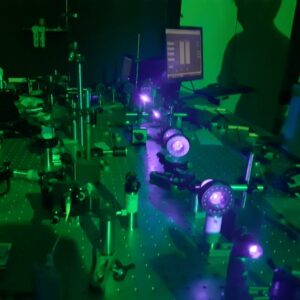Spontaneous parametric down-conversion photon-pair source
Acronyms: GROC
Type: Disciplinario
Year founded: 1993
Coordinator: Francisco De Zela
E-mail address: cuantica@pucp.edu.pe
General objectives:
The quantum optics group at PUCP develops theoretical and experimental research in different subjects, such as geometric phases, the quantum-classical border, fundamental tests of quantum mechanics, open quantum systems, quantum information theory, two-level systems interacting with quantized fields, and others. Our research activities in quantum optics arose from a cooperation in atomic physics between members of PUCP and Colgate University (Hamilton, NY). This was followed by research conducted at the Max Planck Institute for Quantum Optics (Garching, Germany) in micromaser theory. Fundamental tests of quantum mechanics were also addressed theoretically (at PUCP) and experimentally (in cooperation with Colgate University). From 2008 on, experimental research has been conducted at PUCP using both classical and quantum light sources. Our efforts initially focused on generation and measurement of geometric phases using interferometric and polarimetric setups. We could manipulate pure and mixed polarization states of classical and quantum light. This allowed us to explore several features of geometric phases that had remained inaccessible so far. Entangled states of different kinds served also to generate geometric and topological phases subjected to decoherence, so that we could study their robustness under simulated noise sources. This is important for applications in quantum information, which is also a subject of research in our group. This research field includes the design of quantum logic gates that accomplish different processes. The dynamics of entanglement was also addressed in the framework of quantum open systems, for which generation and manipulation of mixed states constitute key resources. We have developed novel techniques to generate partially polarized states of classical and quantum light. We also studied various relationships and constraints between polarization, entanglement, path-distinguishability, etc., which are important to delineate the quantum-classical border.
Besides faculty members, advanced undergraduate and graduate students integrate the quantum optics group at PUCP. Students were trained in our laboratory and through stays at laboratories abroad, such as the Max Planck Institute for the Science of Light (Erlangen, Germany), Colgate University (Hamilton, NY), University of Concepción (Chile), Federal University of Minas Gerais (Brazil) and Federal University of Rio de Janeiro (Brazil). We have developed collaborative efforts with the University of the Basque Country (Spain), the University of Queensland (Australia), and the University of Valencia (Spain).
Research lines:
- Photonics
- Quantum information
- Bell inequalities

